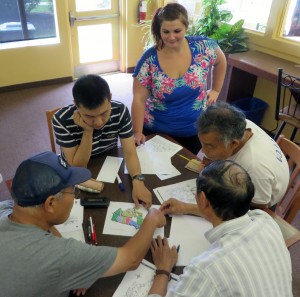- Details
- Published: 07 December 2014
 Interview with: Karen Kew, Community Integration Coordinator, Immigrant Services, Guelph Wellington
Interview with: Karen Kew, Community Integration Coordinator, Immigrant Services, Guelph Wellington
CNPEA: What is a mutual aid model and how does your project use it to support immigrant seniors?
Karen: The mutual aid model has been used in various environments and is similar to a self-help or peer support group model where people come together to tackle a problem and where groups form under many features of a community development model such as: autonomy, empowerment, lifelong learning and knowledge sharing. Ideally the learning comes from the group itself. The challenges are not knowing: how the group will come together; how they will support each other; what type of challenges will arise; and how much organizational work they can do on their own.
What we have found in terms of group formation is that the seniors groups really appreciate the organizational support that we provide. We did some training around the self-help model with the expectation that the trained seniors would then go on to start and run their own groups. Without organizational support it was very difficult to get the groups going and for the organizer to stay motivated. We learned that seniors really need organizational support to thrive because it creates a support network for the group. This could be something as simple as helping the group find a space and making warm referrals in the community.
CNPEA: What are you planning to include in the community toolkit and how can it be used?
Karen: The community toolkit is our main deliverable and will be accessible on our website in early 2015. Our target audiences are seniors, community members and grassroots organizations. The tools walk you through, in plain English, very basic steps for how to start a group, including, recruiting volunteers, volunteer management and working with immigrant seniors. We have created content for the following five main areas; Understanding Elder Abuse, Working with Diverse Communities, How to Start a Group, Complementary Income and Lifelong Learning.
Within the Lifelong Learning section we focus on three types of learning that we have noticed immigrant seniors really appreciate: computer clubs for learning computer literacy, English language practice groups, and wellness programs. In the wellness program we are bringing together the experience of being an immigrant senior with elder abuse awareness and physical and mental health. The mental wellbeing component in particular is really important because there are so many factors for an immigrant senior that intersect with mental health, for example not speaking English can be a barrier to accessing services, which can lead to isolation and so on. If there is a group that, for example, wants to start a yoga group, we have a tool that identifies gentle yoga exercises and also how to incorporate elder abuse awareness, family dynamics and mental well-being lessons into the program.
CNPEA: What strategies has your project used to engage isolated seniors?
Karen: We identified very early on that language is a huge barrier that isolates seniors. We worked to promote the importance of providing interpretation services with service providers and their front line staff, recognizing that interpreters are helpful but cannot address all community development needs. We shifted our focus from recruiting to our programs seniors who already speak English to encouraging specific language communities to start their own groups. Our community development approach is to engage people in various communities to support these groups. We find that intergenerational groups and activities that involve immigrant youth in particular are the most successful.
When Project Wisdom first started in 2010, there was a perception that immigrant seniors would not easily speak about their difficulties. We’ve discovered that immigrant seniors can and do speak about their challenges—but only if a safe space exists. Our settlement counselors received elder abuse training and are using better methods to identify potential cases of abuse and connect seniors with service providers in the community. Interpretation really helps, especially if the senior is in the hospital or a crisis setting.
CNPEA: What else would you like to share about your project?
Karen: We are also exploring using social enterprise components inside a mutual aid model. This allows the program to provide a little bit of extra income for seniors, especially for those who have low or no English skills and who may be totally financially dependent on their adult children under sponsorship agreements, while still using group peer support as a way to reach isolated seniors. There is a Knit a Knot social enterprise group that meets fairly regularly, but are not a knitting group per say; rather, they meet to drop off patterns and pick up wool. This group works well because they are goal-orientated seniors who have a way to connect with others for peer support when needed. If they do not feel comfortable coming out of their house to attend formal programming they can still participate at home and know they are a part of something bigger. Even the little bit of extra income that they can earn through this program is very significant as it can make the difference of being able to say, buy a buss pass and have access to transportation or not. The group is very straightforward and participants knit very simple, easy to learn patterns such as headbands.
















